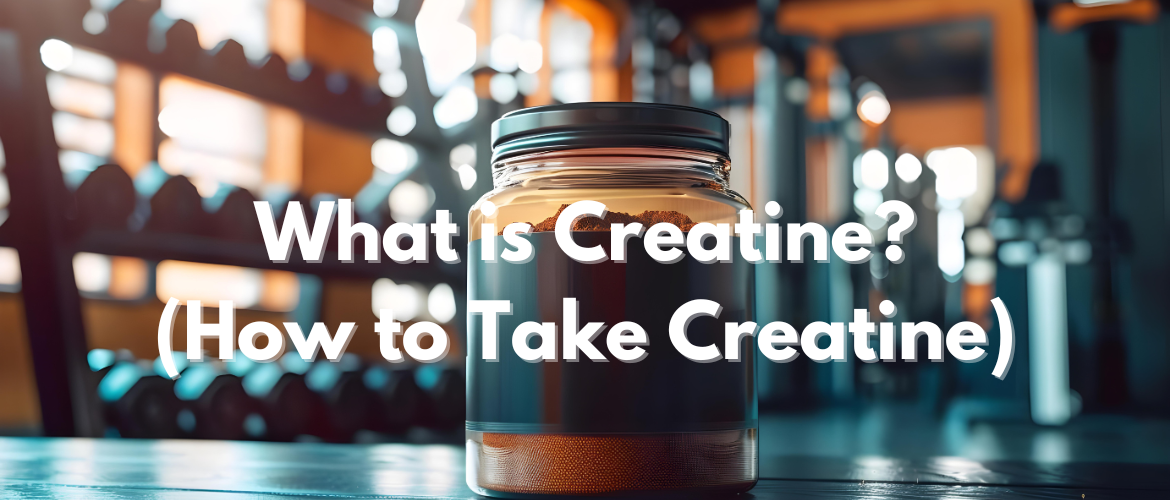No products in the cart.
What is Creatine? (How to Take Creatine)

Introduction: Understanding the Power of Creatine
Creatine is one of the most popular and extensively researched supplements in the fitness industry. Known for its ability to boost energy, enhance muscle growth, and improve athletic performance, creatine is widely used by athletes, bodybuilders, and fitness enthusiasts.
If you’ve ever wondered what creatine is, how it works, and the best ways to take it, this comprehensive guide will break it all down for you. Let’s explore its benefits, mechanisms, dosage recommendations, and common myths surrounding its use.
What is Creatine?
Defining Creatine
Creatine is a naturally occurring compound found in muscle cells. It plays a vital role in energy production, particularly during high-intensity exercise, such as sprinting or weightlifting.
Sources of Creatine
Creatine is synthesized in the body from amino acids (arginine, glycine, and methionine). It can also be obtained from dietary sources, primarily red meat and fish. However, to maximize its benefits, creatine supplementation is often recommended.
How Does Creatine Work?
Creatine enhances the body’s ability to produce adenosine triphosphate (ATP), the energy currency of cells. During high-intensity exercise, ATP is rapidly used up, and creatine helps replenish ATP levels, improving endurance, strength, and recovery.
Benefits of Creatine
1. Increased Muscle Strength and Power
Studies show that creatine supplementation improves strength and power output, making it highly beneficial for weightlifters, sprinters, and athletes engaging in explosive movements.
2. Enhanced Muscle Growth
Creatine promotes muscle hydration, leading to increased cell volume and muscle fullness. Over time, it contributes to muscle hypertrophy (growth).
3. Faster Recovery
Creatine reduces muscle damage and inflammation, allowing quicker recovery between intense training sessions.
4. Improved Brain Function
Beyond muscle benefits, creatine supports cognitive function, improves memory, and may help individuals dealing with neurological conditions like Parkinson’s disease.
5. Boosted Performance in High-Intensity Exercises
Creatine enhances performance in short bursts of maximal effort, such as sprinting, heavy lifting, and explosive sports like football and basketball.
How to Take Creatine Correctly
1. Choosing the Right Type of Creatine
There are multiple forms of creatine, but the most widely studied and recommended form is Creatine Monohydrate. Other forms include:
- Creatine Hydrochloride (HCl) – Claimed to improve solubility.
- Micronized Creatine – Finely ground for better absorption.
- Buffered Creatine – Less acidic, reducing stomach discomfort.
Creatine Monohydrate remains the gold standard due to its cost-effectiveness, safety, and proven results.
2. Understanding the Loading Phase
Some athletes follow a loading phase to quickly saturate their muscles with creatine.
- Typical Loading Phase:
- 20g per day (split into four 5g servings) for 5–7 days.
- This helps rapidly increase creatine stores in muscles.
3. Maintenance Dosage
After the loading phase, a daily dose of 3–5g is sufficient to maintain elevated creatine levels in muscles.
4. Best Time to Take Creatine
Creatine timing can vary based on fitness goals. Common strategies include:
- Pre-Workout: Helps maximize ATP availability.
- Post-Workout: Aids muscle recovery and absorption.
- Anytime: Creatine stores in the muscles, so taking it daily matters more than specific timing.
5. Mixing Creatine for Best Absorption
- Dissolve creatine in warm water or juice for better absorption.
- Avoid mixing it with caffeinated beverages, which may reduce effectiveness.
Common Myths and Misconceptions About Creatine
1. Does Creatine Cause Kidney Damage?
No scientific evidence supports the claim that creatine causes kidney issues in healthy individuals. However, those with pre-existing kidney conditions should consult a doctor before using it.
2. Does Creatine Make You Fat?
Creatine draws water into muscle cells, causing temporary weight gain from water retention, not fat gain.
3. Is Creatine Only for Bodybuilders?
No! Creatine benefits all types of athletes, including sprinters, football players, and endurance athletes.
4. Does Creatine Cause Hair Loss?
There is limited evidence suggesting creatine affects DHT levels (a hormone linked to hair loss), but no definitive proof that it directly causes hair loss.
5. Do You Need to Cycle Creatine?
Unlike some supplements, creatine does not need to be cycled. You can take it daily without breaks for long-term benefits.
Creatine Safety and Side Effects
Is Creatine Safe?
Yes! Creatine is one of the most researched supplements and is considered safe for long-term use in healthy individuals.
Possible Side Effects
Some users may experience:
- Mild bloating (during the loading phase).
- Dehydration (if water intake is insufficient).
- Stomach discomfort (when taken in excessive doses).
Who Should Avoid Creatine?
- Individuals with kidney disease or pre-existing medical conditions.
- Those sensitive to water retention effects.
- Pregnant or breastfeeding women (due to limited research in these groups).
Conclusion: Should You Take Creatine?
Creatine is one of the safest, most effective supplements for muscle growth, strength, and athletic performance. Whether you’re a beginner or an experienced athlete, incorporating creatine into your routine can significantly improve training results.
Key Takeaways:
✅ Creatine boosts ATP energy, improving performance in high-intensity activities.
✅ It supports muscle growth, strength, and recovery.
✅ Creatine Monohydrate is the best and most proven form.
✅ A daily dose of 3–5g is effective for long-term benefits.
✅ No need to cycle creatine—it can be taken consistently.
✅ It is safe for healthy individuals, with minimal side effects.
Start supplementing with creatine today, and take your workouts to the next level! 🚀💪
Start your wellness journey today — Visit Unike Nutra Now
Follow us
Facebook – https://www.facebook.com/profile.php?id=61567462823245
Instagram – https://www.instagram.com/unikenutra/
Twitter – https://x.com/Unikenutra
LinkedIn: https://www.linkedin.com/company/unike-nutra/
Amazon: https://www.amazon.com/stores/UnikeNutra/
Buy Now:
